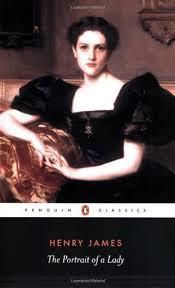 Henry James is one of those authors I’ve always felt I should read. I’ve studied the British classics far more than the Americans, and to be honest I’ve never been a fan of Hawthorne or Hemingway.
Henry James is one of those authors I’ve always felt I should read. I’ve studied the British classics far more than the Americans, and to be honest I’ve never been a fan of Hawthorne or Hemingway.
The Portrait of a Lady was first published as a serial in 1880 and then as a novel in 1881. It tells the story of Isabel Archer, an American woman who meets her aunt when her father dies. Her aunt invites her to stay with them in England, and Archer meets her cousin Ralph Touchett and charming neighbor Lord Warburton, both of whom fall in love with her. She is followed to England by her American suitor, Caspar Goodwood.
Isabel is smart, beautiful, and independent. She wants to explore the world, not settle down. So all these men proposing to her only makes her want to run away and be free.
I remember reading somewhere that not much happens in the first 400 pages of this novel, and that’s certainly true. In fact, not much happens in this novel at all. Isabel comes into money, explores the world, and marries. The cover of this book will tell you that the story is really about the mistake she makes in choosing a husband, so I don’t feel I’m giving away anything. Isabel is intelligent but not so smart… she rejects the advice of everyone around her, and has plenty of time to regret it later.
Did I enjoy this book? Hmmm… First I’ll give my usual caveat, when it comes to classics. This is probably not a book meant to be read alone, it should be studied and discussed. Without the benefit of a literature class, I’ll say this. I liked the contrast presented between the Americans and the British, and I also liked reading about Italy. I liked the side characters of Isabel’s friend Harriet and cousin Ralph. I especially liked Lord Warburton, who I pictured in my mind as Matthew from Downton Abbey.
I had mixed feelings about James’ writing. At times the book felt really engaging and easy to read, and at times it was a slog. Sometimes he takes pages and pages to write about the simplest things. And because there’s little action in this book, those pages and pages are character development, which is in some ways good and some ways frustrating. Take, for example, when James finally gets around to telling you how Isabel feels about her marriage. And then he goes on and on, till you’re so far in her head you can’t wait to get out.
I had a hard time sympathizing with Isabel. She gets everything handed to her and everyone falls all over her, but it’s a little hard to see why. I wanted to like her more. I can certainly sympathize with making bad choices and being taken advantage of – but she’s not all that likeable. And I have to say that the number of people in this book that spend their time worrying about Isabel’s well-being is maddening.
I found myself comparing her to Bathsheba Everdene in Far from the Madding Crowd. Similar story, about a strong woman who wants freedom but succumbs to love and marriage instead. Hardy also is not the easiest author to read, and yet I agonized for Bathsheba, where I found Isabel to be kind of whiny. Because let’s face it, when Bathsheba gets married she stands to lose everything she ever worked for, while Isabel maintains her fabulous lifestyle and is just married to a cold, manipulative spouse. We just never see any passion in Isabel (at least not until a scene towards the end).
As with a lot of classics written by men about women, it’s interesting to ask whether this is an enlightened portrayal of smart, independent women (Isabel’s friend Harriet is a groundbreaking journalist, and the other women are strong and opinionated as well), or a depiction of a woman facing her downfall because of society’s strictures or because she is in fact weaker than the men around her. This is where a lit class would be helpful. In most of these “types” of books, it’s sexuality and passion that is the woman’s downfall (think Tess, Madame Bovary). Here sexuality is nearly absent, although it’s hinted at times. Really she falls prey to her own ideals.
What was most interesting about this book, in addition to its presentation of women as smart and independent, was the idea that money and class can be one’s downfall as well as a benefit. Isabel begins the story with nothing; having wealthy British neighbors is simply a lucky break. If she remains poor, she’s dependent on family or a spouse. But when she has money, she becomes prey. She shies away from Goodwood and Warburton because of their money and class, and this leads to her marrying a man who has neither. She feels like she’s rebelling against society’s values but in truth she’s just being manipulated.
The Portrait of a Lady has an interesting ending but one I won’t tell you– since I think even classics can be “spoiled”. James builds up a lot of tension around what Isabel should do about her lousy marriage, and everyone around her has an opinion. But I won’t tell you what happens, you’ll have to read it yourself.
Should I have liked Isabel more? Should I have sympathized more? Probably. Or maybe not. This is James’ view of what an independent woman is like, but maybe it would be better coming from a woman. Amazon says if I like James I should read Edith Wharton, and I plan to.
This book counts towards The Classics Club, The TBR Pile Challenge, and the Back to the Classics Challenge.

